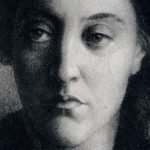Not like the brazen giant of Greek fame,
With conquering limbs astride from land to land;
Here at our sea-washed, sunset gates shall stand
A mighty woman with a torch, whose flame
Is the imprisoned lightning, and her name
Mother of Exiles. From her beacon-hand
Glows world-wide welcome; her mild eyes command
The air-bridged harbor that twin cities frame.
“Keep, ancient lands, your storied pomp!” cries she
With silent lips. “Give me your tired, your poor,
Your huddled masses yearning to breathe free,
The wretched refuse of your teeming shore.
Send these, the homeless, tempest-tost to me,
I lift my lamp beside the golden door!”
Emma Lazarus is one of few authors, whose lines are carved in stone. Even not in a simple stone, but in the pedestal of the sculptural statue, which became the symbol of America.
The sonnet for the opening of the unique gift of France to the United States was written by Emma Lazarus in the 1883 and became the most popular work of the poetess. Admittedly, she long refused to compose that poem. Because the poetic contest, in the jury of which all wanting Americans were present, was declared for the opening of the New Colossus, a huge sculptural image matching the legendary Colossus of Rhodes. One was to vote for a preferred poem by money – thus, the means for creation of the pedestal for majestic Virgin gifted by France were collected. One is also to remember, that the French sent the monument across the ocean as a statue of Mother of God, Virgin Mary, but it was decided during transfer to focus on the more politically correct name Statue Of Liberty, under which the monument is known up to now.
For understanding of the poem essence, one must refer to one more context of its creation – the context of the author identity. The Emma American Lazarus ancestors had arrived to the USA from Portugal, because it had been unsafe for Jews in the Old World of that time (the pogroms had alternated with false accusations of heresy in front of the Inquisition). Being the descendant of refugees, Emma gave much of her time and energy for the support of Jewish immigrants from the Russian Empire. That support was provided both economically (Emma’s family was rich enough) and in a journalistic way. Emma Lazarus wrote many articles addressed to the Jews living in the USA who did not overly strive to help coming fellow countrymen, although sacred books require that. In addition, she translated some verses of a religious content from Hebrew into English.
Such classical philologists of American literature as Mark Twain and Walt Whitman, Bret Hart and Gurney Longfellow, as well as hundreds of less known authors were Among the participants of that contest. But the poem created by Emma Lazarus in the framework of her own programme supporting all refugees arriving to the USA got more than 21.000 votes (expressed in a dollar equivalent) just in two days, as a result of which the first prize was awarded to Emma.
The addressing just to Virgin Mary, which later was interpreted precisely as the addressing to Lady Liberty as to the symbol of the USA, can be unmistakably heard in the words of the poem. Invoking the Virgin, Emma Lazarus calls her “Mother of Exiles”, meaning the Jewish people from all over the world, as well as everyone, who looks for help and support of the supreme forces. Beyond any dependence on how one calls these forces. And the author puts words into the Virgin’s mouth: “Keep ancient lands, your storied pomp!… Give me your tired, your poor, Your huddled masses yearning to breathe free“, the direct analogy of which is easily found in the Bible that Emma Lazarus, who had a good education, knew well. “Come to Me all distressed and oppressed ones and I will quiet you” of Matthew 11.28. Only this appeal has already received somewhat other, but not less deep, sense in a new context.
Reviewed by Katerina Sidoruk



